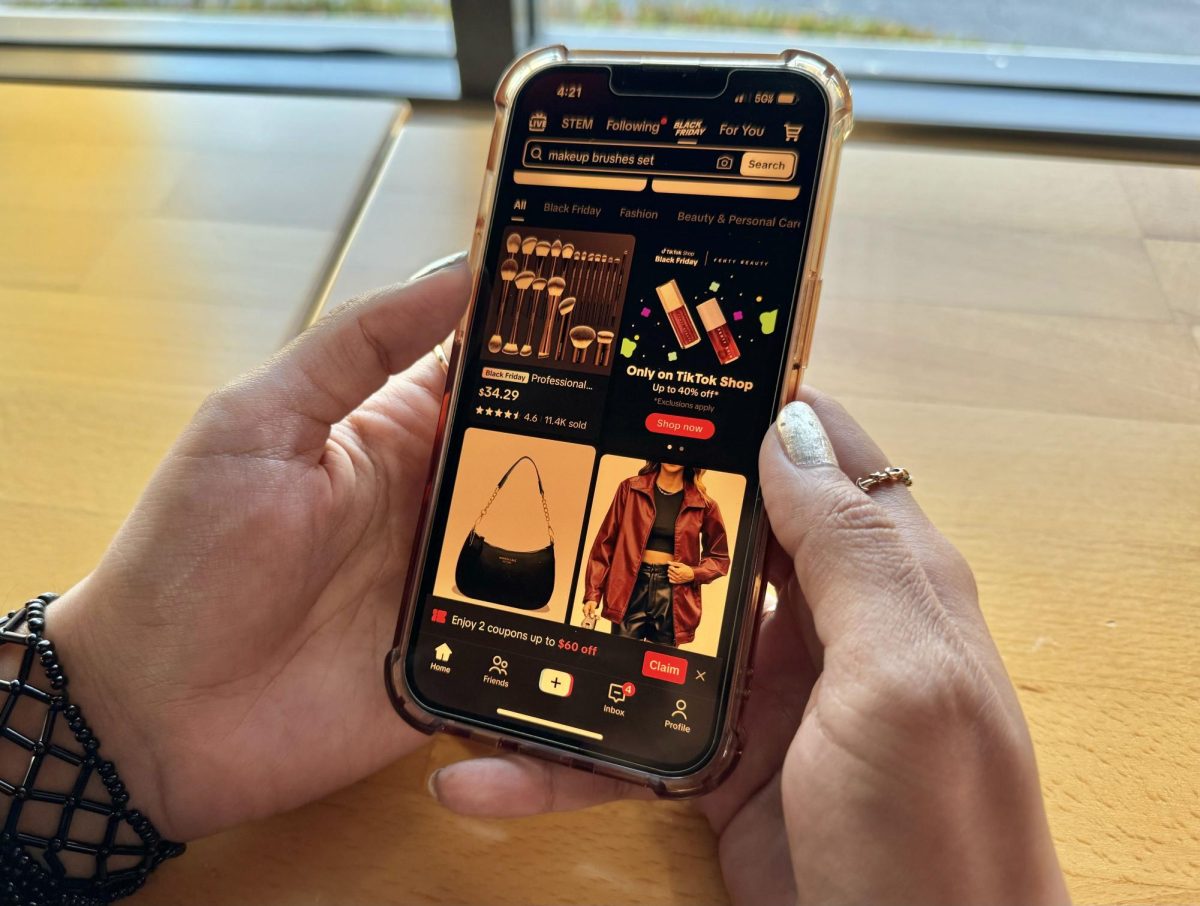Social media platforms such as Instagram and TikTok are normalizing consumerism in younger generations.
According to Merriam-Webster, consumerism is defined as “The theory that an increasing consumption of goods is economically desirable.”
It is fairly common to scroll down any social media platform and run into advertisements promoting the unethical practice; from influencers promoting hundreds of dollars worth of fast-fashion hauls to TikTok users showing off their shelves of their Stanley Cup collections in every color imaginable.
I have undeniably been guilty of this habit, including purchasing the latest iPhones every couple of years, despite my previous phone being in good condition. I’ve also bought clothes from fast-fashion stores such as H&M due to its low prices and trendiness.
These same brands have also faced backlash for their practices, with Apple admitting they purposely slow down older iPhones through software updates, according to the BBC. H&M has also been accused several times of “greenwashing” despite their efforts to be a sustainable brand.
According to Oberlo, Generation X is currently the largest consumer. However, Generation Z is on track to becoming the largest consumer generation in history. By 2030, the generation’s spending is expected to reach 19%, according to data from Statistica.
Despite the concerning numbers, Gen Z is widely considered to be the most environmentally conscious and sustainable, per Ulster University.
According to Forbes Magazine, numerous Gen Z shoppers prefer to buy from sustainable brands and 75% of surveyors search for authentic brands that ensure employee and customer safety.
Students at California Lutheran University are raising efforts to educate the community on sustainability.
Senior Elaine Vo organized this year’s Sustainable Fashion Festival at Cal Lutheran. The festival ran from Nov. 19-21, with various events including speaker Bennett Ray from Patagonia, a workshop on how to reduce waste and a sustainable fashion styling workshop with Charline Zeroual, a Los Angeles-based French personal stylist.
Zeroual not only taught the audience how to define their personal style and color palette, but also how to value quality over quantity, shop local, and make the most out of clothing you own.
Vo said she hoped the festival achieved success in educating those who are uninformed.
“A lot of people know the term ‘fast fashion,’ but they don’t know the extent to which it impacts the world around them. So I feel like having these events and hopefully integrating it into the curriculum for school will help people understand how much of an impact they have on the environment. And also the humans that are behind the clothing production,” Vo said.
Junior Cristiann Dipietrantonio is the president of the Earth Society. She said the club has participated in many efforts to promote sustainability including a clothing swap on campus and events where they taught people how to upcycle their clothes along with how to re-wear them in different ways.
In the article “How Social Media Impacts Consumer Buying,” Rebecca Kowalewicz said social media has created a new level of relationship between brands and consumers. Per the article, 80% of consumers’ buying decisions are influenced by a friend’s social media post; the virtual version of word-of-mouth.”
Dipietrantonio said everyone has been guilty of mass consumption.
“I think everyone is a victim of consumerism, no matter how sustainable you try to be. Just the way our system is set up, we are meant to be consumers,” Dipietrantonio said.
She said it is a mixture of affordability and the self-conscious feeling of approval that promotes unhealthy consumerism.
“I’ve gotten clothes from Ross and, like, Marshalls just because, like, that was what is affordable … there’s also the fear of being shamed for not having nice clothes or from thrifting clothes,” Dipietrantonio said.
She gave multiple initiatives Cal Lutheran can make to address consumer-driven environmental issues including creating a larger and permanent clothing swap inside the chapel.
“If you have moved out of Cal Lu for the summer, you may notice that a lot of things get thrown away. If we were able to set up a program where there’s, like, trading, if the summer residents would want to keep any of that furniture, that would be really helpful in reducing our waste,” Dipietrantonio said.
Dipietrantonio said we as a generation have moved slightly away from the idea that re-wearing clothing is bad, but that social media still promotes unhealthy fashion habits. It does not show the ugly side of overconsumption, such as unpaid child labor.
Forbes Magazine reports that as active consumers, we’re exposed to around 4,000 to 10,000 advertisements every day, ranging from billboards to social media posts. We will not be inundated by overconsumption, ads, and waste.
While I believe consumerism is a huge issue promoted by social media, we have a strong generation of leaders who strive to educate those on how detrimental our shopping habits are. We can make a difference, and it starts locally.







